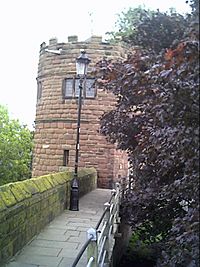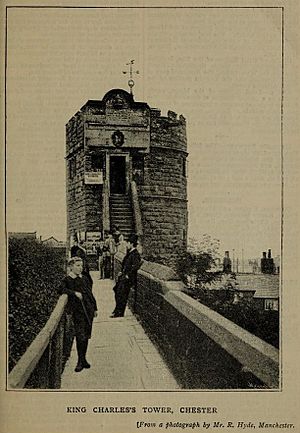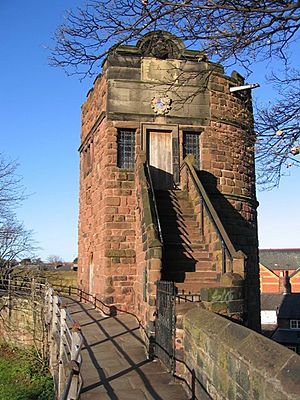Phoenix Tower, Chester facts for kids
Quick facts for kids Phoenix Tower, Chester |
|
|---|---|
| Native name Newton Tower, King Charles' Tower |
|

Phoenix Tower
|
|
| Location | Chester, England |
| OS grid reference | SJ 406 667 |
| Built | 13th century (?) |
|
Listed Building – Grade I
|
|
| Designated | 28 July 1955 |
| Reference no. | 470151 |
| Lua error in Module:Location_map at line 420: attempt to index field 'wikibase' (a nil value). | |
The Phoenix Tower is an old building located at the northeast corner of the Chester city walls in Chester, England. It's a very important historical site. The tower is officially recognized as a Grade I listed building. This means it's a building of special historical interest. Over time, it has also been known as Newton Tower and King Charles' Tower.
Contents
History of the Phoenix Tower
The Phoenix Tower was likely built in the 13th century, which is a very long time ago! In the late 1500s, two city groups called guilds took care of the tower. Guilds were like clubs for people who did the same job, such as painters or barbers. These guilds would then rent out parts of the tower to other guilds.
By 1612, the tower was in bad shape. Its roof had lost its lead covering. The two guilds worked together to fix it up. In 1613, they put a special stone plaque above the door. This plaque showed the date and a carving of a phoenix. A phoenix is a mythical bird that rises from ashes, and it was the symbol of the Painters' Guild.
The Tower During the Civil War
During the English Civil War in 1645, the tower played a role in the Siege of Chester. It had a gun on each floor and was damaged during the fighting. A plaque on the tower says that King Charles I stood there on September 24, 1645. He supposedly watched his soldiers lose the Battle of Rowton Heath from the tower.
However, some historians, like Simon Ward, think this might not be true. They suggest the king might have stood on a tower at Chester Cathedral instead. This idea is supported by a story that a captain standing next to the king was hit by a stray shot.
Later Years and Restoration
After the Civil War, the guilds got the tower back in 1658 and repaired it again. They stopped owning it around 1773, and the city of Chester took over its care. But by 1838, the tower was described as being very run down.
Even so, the city started promoting it as a place for tourists to visit. This was because of the popular story about King Charles I. In the late 1850s, a print-seller used the bottom room. Later in the century, the tower became a private museum.
What the Phoenix Tower Looks Like
The Phoenix Tower is built from red sandstone blocks laid in even rows. It has a pointed roof made of slate. The tower is about 70 feet (21 meters) tall and is shaped like half a circle.
The tower has four main sections, called stages. The bottom two stages are actually below the level of the walkway on the city wall. The top two stages each have a room inside. At the level of the walkway, in the third stage, there is a rounded doorway. Above this doorway is the famous plaque from 1613 with the phoenix carving.
An outside staircase leads up to the top floor. Inside, the bottom room is shaped like an octagon (an eight-sided shape). It's about 30 feet (9 meters) across and has five narrow slit windows. These windows were often used for shooting arrows from.
On the outside, between the two upper stages, there's a decorative stone band called a string course. The very top stage has another doorway and four windows with three panes of glass. These windows have leaded frames and can be opened like a door. The top of the tower has a battlemented parapet, which is a low wall with gaps for defense. It also has lead hip roofs and a fancy weathervane on top.
 | Madam C. J. Walker |
 | Janet Emerson Bashen |
 | Annie Turnbo Malone |
 | Maggie L. Walker |



